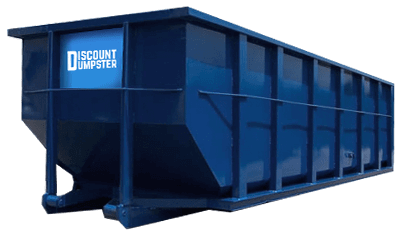It is probably no surprise to hear that there are a lot of different types of flooring. (Think: laminate, hardwood, vinyl, tile, stone, concrete, carpet, rubber flooring, etc.) However, what type of flooring is the most common? And with so many to choose from, which type of flooring is right for your home?
Because the floor covers the largest surface area in a home, selecting the right type of flooring can be a tough decision for homeowners. Ultimately, picking the best kind will depend entirely on an individual’s budget, lifestyle, and personal preference.


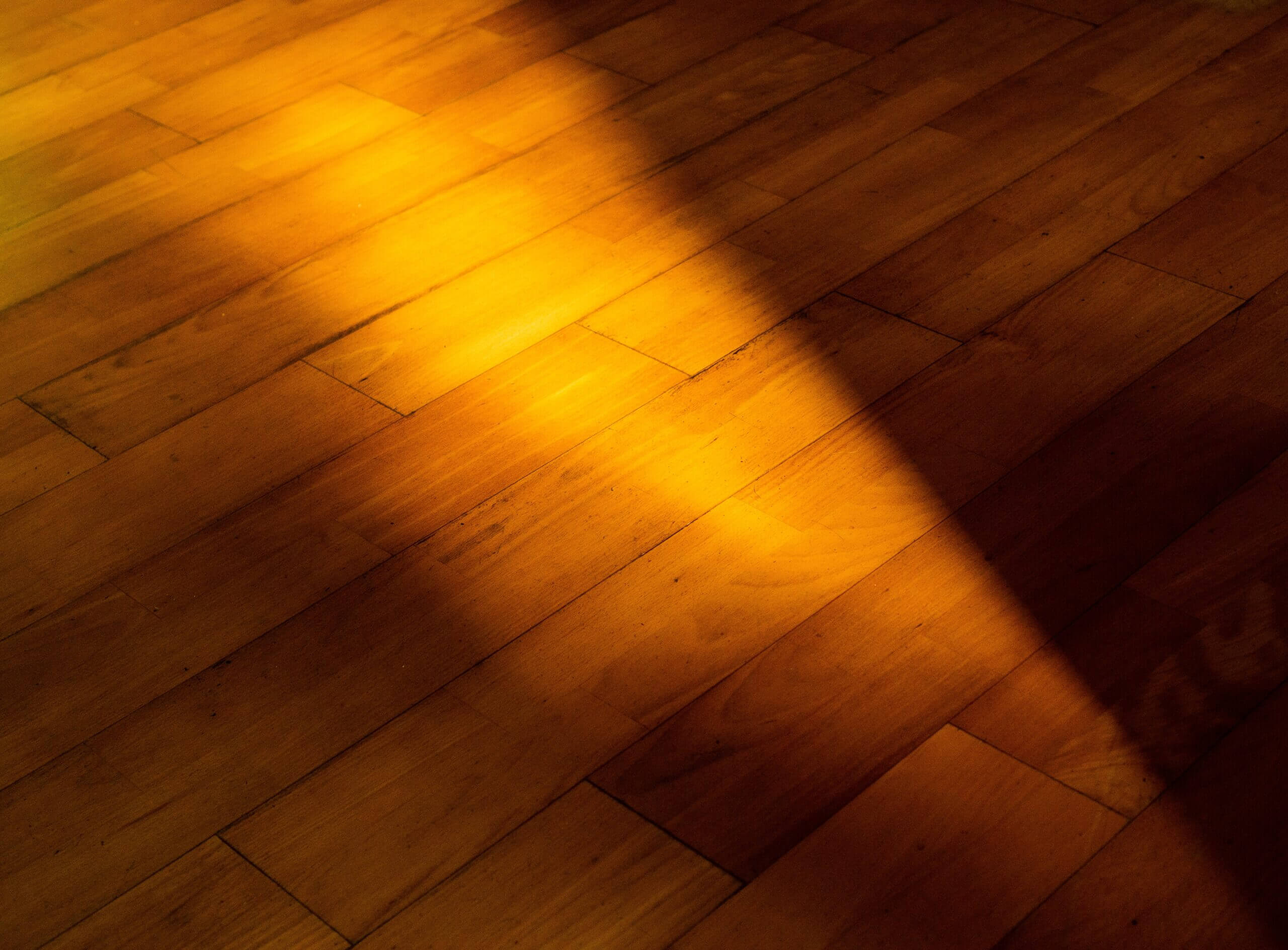
Considering 80 percent of laminate flooring is wood, a lot of people wonder if it can simply be burnt or incinerated like real wood or other wood products? Well, the answer is no.
Because the top layer of laminate contains an aluminum oxide coating, it becomes dangerous when incinerated. Not only does it burn the air, but burning laminate poses serious health risks if ingested by humans or animals.
So, if you can’t burn it, how are you to properly dispose of laminate flooring? Well, our team here at Discount Dumpster has got you covered!
If you’re looking to simply dispose of your old flooring yourself, renting a roll-off waste container is a great option. Because flooring doesn’t usually fit inside your household’s garbage bins, a dumpster container is a quick and easy way of getting rid of it.
Here at Discount Dumpster, we handle all the dumpster’s transportation (for no extra cost!). Therefore, all you have to worry about is filling your dumpster with flooring materials, unwanted junk, and demolition waste, and we’ll take it from there!
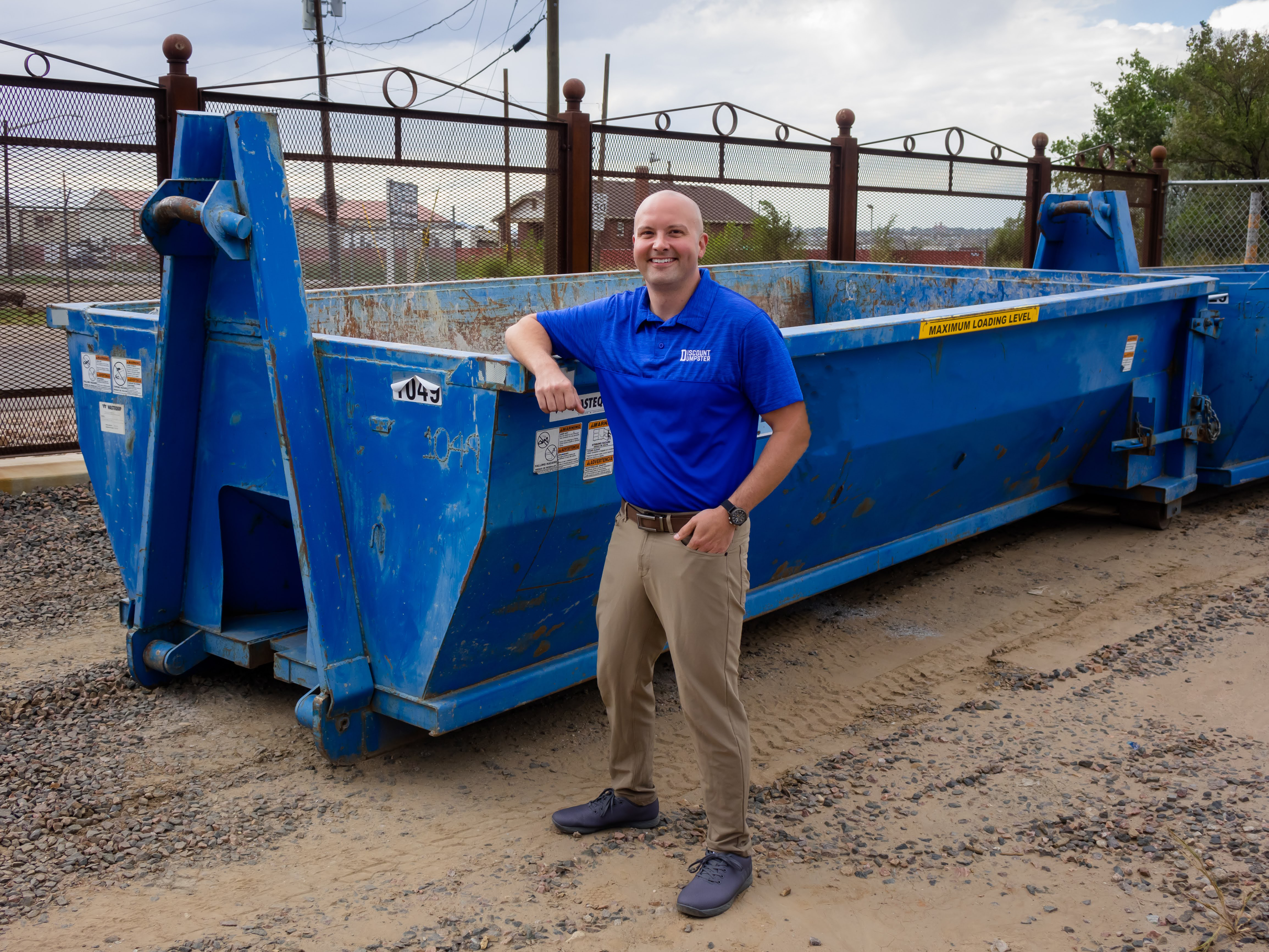
Whereas you weren’t previously able to recycle laminate flooring, new technological processes have changed the game. Today, 85 percent of laminate’s mass can be put back into the manufacturing process through wood fibers and/or wood chips. Therefore, one of the best ways to get rid of your old laminate planks is simply to recycle them.
Of course, this doesn’t mean simply tossing your old laminate flooring into your household recycling bins and calling it a day. The recycling process for laminate is a bit more than what your local recycling facility can handle. For this reason, you should contact your laminate manufacturer to learn how to best recycle your old flooring.
Most laminate manufacturers have a recycling program in place, and — if you’re lucky — some will even come and pick up the flooring themselves.
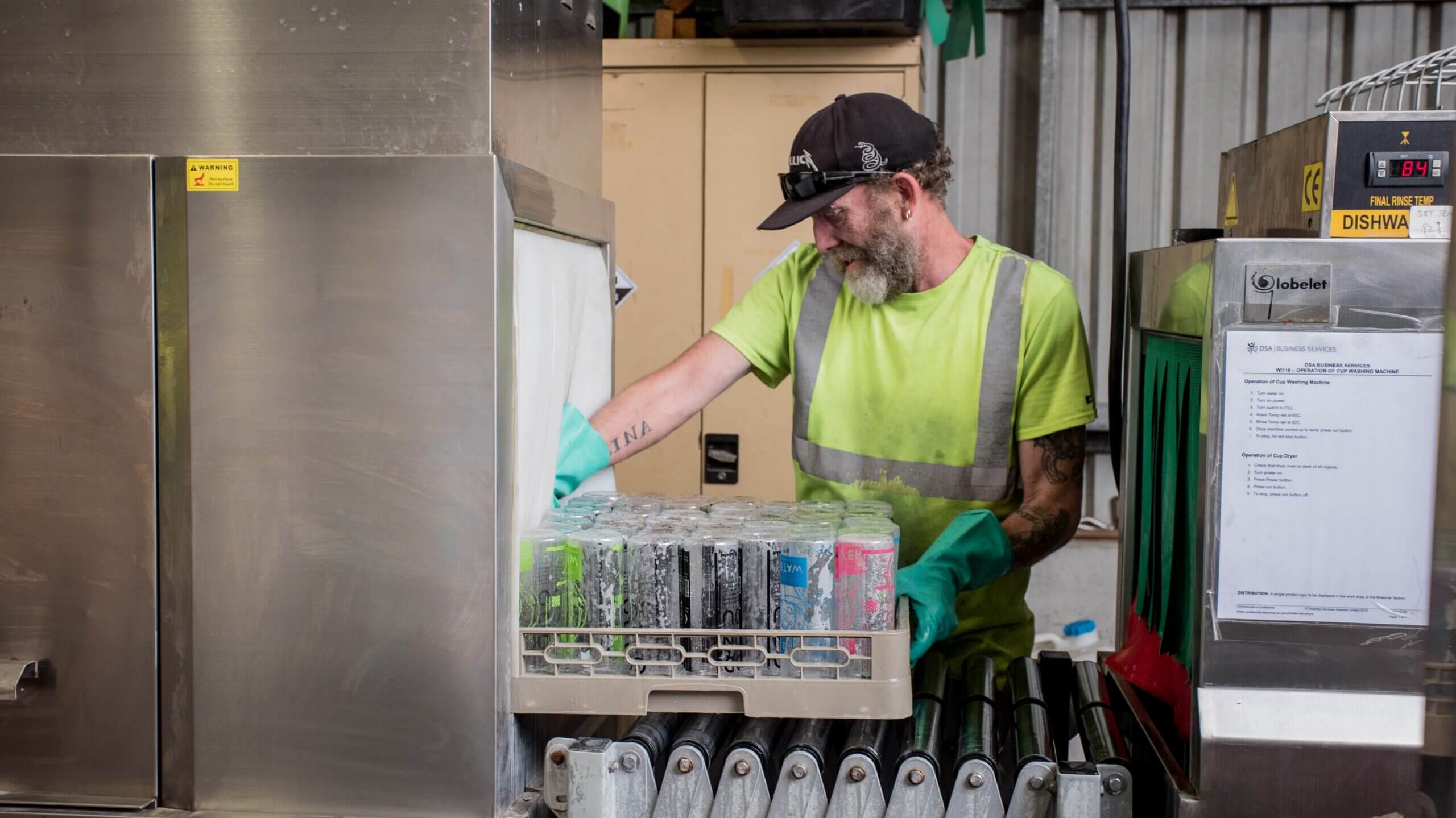
As with any flooring installation, there will be leftover installation materials and debris that need to be disposed of. If the waste is minimal, you can dispose of it in your normal household waste collection.
However, most jurisdictions have size restrictions on what you can toss in your trash cans (and unfortunately, laminate flooring usually exceeds that). Sometimes, you can pay extra to schedule a special pick-up for your laminate flooring, however, there are better ways to get rid of your laminate flooring.
Renting your own roll-off dumpster container is a great option for floor disposal projects. Not only is a dumpster rental guaranteed to hold your old laminate flooring, but you can toss any demolition materials, household waste, or unwanted junk in with it.
The final way to get rid of your old laminate flooring is to upcycle or repurpose it. Any DIYer knows that there are plenty of uses for leftover laminate, and it is probably a lot easier than you think to breathe some life back into your old flooring. Before you recycle or toss your leftover laminate planks, see if there is a way to turn them into coasters, coat racks, welcome signs, or anything else your heart desires.
Wondering what to do with your old vinyl flooring? Curious if you can toss it in the garbage? Want to know if it’s toxic to the environment? Or unsure if vinyl recycles?
If you have just removed your vinyl floor planks, then you are probably asking yourself those sorts of questions. Lucky for you, you’ve come to the right place. Our team here at Discount Dumpster is covering everything you need to know about disposing of vinyl flooring.
It is possible to recycle polyvinyl chloride, it isn’t very easy, and for economic reasons, recycling centers typically recycle polyvinyl chloride-based products in low volumes.
To recycle vinyl flooring, recyclers must ground it into pellets that can be melted down to create other products. However, because recycling vinyl doesn’t have any effect on the chain length of its molecules, you can recycle vinyl products up to eight times.
If you can’t find a vinyl recycling facility in your area, you might wonder if you can toss it in the garbage? While most jurisdictions have limits as to what can go in your normal household waste disposal, a roll-off dumpster rental will get the job done.
Studies show that vinyl flooring can release harmful toxins and chemicals that can lead to air pollution and contamination. Of course, this depends on the quality of your vinyl flooring.
Generally, vinyl releases a small amount of volatile organic chemicals (VOCs) into the air for about three to five weeks after its installation. For that reason, it is a good idea to ventilate the area and keep pets, children, and pregnant women out of reach.
Have a bunch of leftover vinyl flooring on your hands? Not a problem. There are a ton of different uses for scrap vinyl flooring:
A lot of homeowners opt for hardwood flooring because they consistently maintain a high ROI. However, what happens when it comes time to replace them? How are you supposed to dispose of your old hardwood flooring?
Thankfully, our team here at Discount Dumpster has the answers. Keep reading to learn what you can do with your old hardwood floors.
Renting a dumpster is the cheapest option when it comes to hardwood flooring disposal. Dumpster rentals give you a safe and convenient spot to toss as much planks as you need to. Lengthy rental periods also give you flexibility during the disposal process.
Discount Dumpster rents dumpsters at a flat-rate with free delivery and pickup. All taxes and local fees are included in the price, with a base rental period of 7 -14 days.
It is unlikely that you will be able to toss your old hardwood planks into your household’s garbage cans. Therefore, one way to dispose of your hardwood flooring is to toss it into the bed of a pickup truck (either yours or a rental) and haul it to your local landfill. While this is a relatively affordable option, it is up to you to find out if the landfill accepts wood flooring and, if so, the best time to drop it off.
DIYers are constantly scouring Craigslist and local remodeling/home improvement forums looking for used hardwood flooring. Therefore, you can list your old hardwood flooring online and see if any local salvagers would want to look at it, make an offer, and hopefully take it off your hands.
If your wood is still in relatively good condition, you could try contacting your local flooring contractors. Some stores specialize in salvaged wood flooring, and while they might not want all of your wood, they could definitely take some of it off of your hands. Additionally, many professional wood salvagers will collect the wood directly from your home, which saves you transportation costs.
Who knows who will come and take your old hardwood flooring if you leave it in your front yard with a sign marked free? You might be surprised how many people would take your old hardwood if you simply asked around.
For faster results, you could donate your used wood flooring to an organization like Habitat for Humanity. Not only are housing organizations always looking for more wood, but they often have professional volunteers who can transform your old floor into a brand new one for someone in need.
Some hardwood has been re-sanded and/or refinished one too many times to be used as flooring again. If this is the case, a terrific use for your old hardwood flooring is simply to repurpose it.
There are tons of DIY home improvements that could utilize your old wooden flooring planks. In need of a new fence? Interested in a new doghouse? Considering fencing off a garden area? Want to build that workbench you’ve always dreamed of? Old wooden flooring will certainly do the trick.
Even if you don’t have any DIY projects that could use your old hardwood flooring, your friends and neighbors might. Be sure to check in with your loved ones, or you could contact your local school’s workshop. Trust us, someone is bound to have a project that could use some old hardwood.
Upcycling is all the rage right now, and for good reason! It is a creative, do-it-yourself way to repurpose your old wooden floorboards, and it is probably a lot easier to do than you think.
If you’re looking to breathe some new life into your hardwood flooring, research how to turn it into an accent wall, a bar top, a tree house, planters, or a toy box – the possibilities are endless!
If you are looking for an affordable way to get rid of your hardwood flooring, then renting a dumpster is the option for you. Discount Dumpster charges low, flat rates that are based on a unit’s size, weight, and location. And because a floor disposal project requires either a 10 or 20 yard dumpster, you will be eligible for our least expensive option.
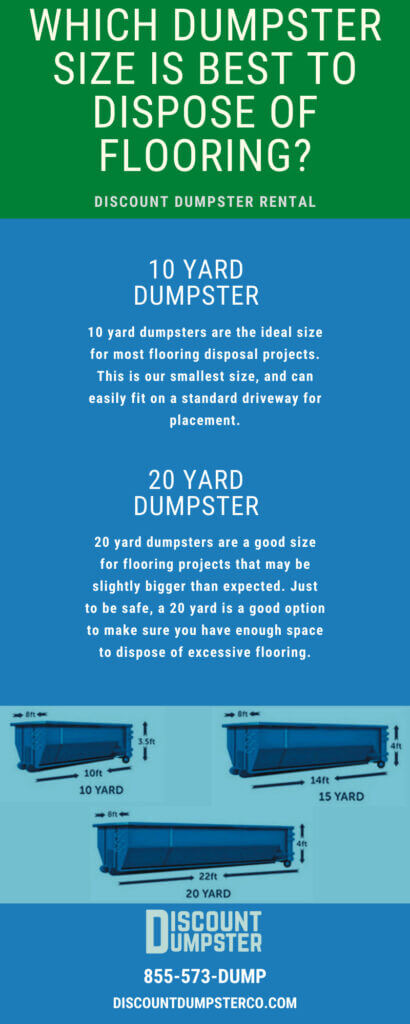
If you’ve recently undergone a flooring installation, you might be wondering what to do with your old flooring? If this sounds like you, you’ve come to the right place. Our team here at Discount Dumpster has the solution to all your debris-removal needs.
While there are a ton of different ways to get rid of your old flooring and demolition debris, renting a roll-off dumpster container is the best. Because a dumpster rental holds most items that are prohibited from going in your normal household waste collection, they make DIY construction and demolition projects a breeze.
Renting dumpsters is the most affordable and efficient option for flooring projects. Some flooring material, as mentioned, cannot be placed in normal trash pickup.
Junk haulers may seem like a good option, yet are really only good for one-and-done trash removal. If you're replacing flooring across an entire room or home, junk haulers will have to make multiple trips. The costs for these trips are then passed to you, the customer.
Dumpster rentals give you a convenient spot to toss all of your flooring waste. Our dumpsters come at a flat-rate cost, which includes delivery and pickup services. With rental periods up to 14 days, you also have plenty of time to toss your flooring material as you see fit.
What are you waiting for? Call Discount Dumpster Today!
Vinyl flooring is a flooring material that should not be placed in a dumpster rental. Vinyl is classified as a plastic, and should only be disposed of in specialized recycling centers.
We recommend not overfilling the dumpster. Every dumpster has a fill line, which waste should not go over. It is also wise to monitor how much flooring waste you are tossing. If your dumpster is overweight when it reaches the dump site, you will be charged an additional fee per ton overweight.
The best dumpster sizes for flooring disposal would be a 10, 15, or 20 yard dumpster. However, if the flooring project is big enough, you may consider a 30 yard dumpster as well. This is especially true if you're planning a whole home remodel or renovation.
You are always welcome to extend your rental period at any time. Just note that there will be a small fee per extra day you hold onto the dumpster.
Hardwood flooring is definitely allowed for disposal in a dumpster rental! However, depending on your service area, there may be limitations on hardwood flooring that has been painted or finished with certain chemicals. We advise contacting us ahead of time to thoroughly discuss the nature of your flooring project.
Permits should only be needed if your dumpster needs to be placed on a street or public-right-of-way. Dumpsters placed on private property shouldn't need permits. However, if your property is governed by an HOA, you should seek their permission before proceeding with your rental. Consult our resource on permits for more information.
ALABAMA:
ARIZONA:
ARKANSAS:
CALIFORNIA:
COLORADO:
FLORIDA:
GEORGIA:
IDAHO:
ILLINOIS:
INDIANA:
IOWA:
KANSAS:
KENTUCKY:
LOUISIANA:
MARYLAND:
MASSACHUSETTS:
MICHIGAN:
MINNESOTA:
MISSOURI:
NEBRASKA:
NEVADA:
NEW MEXICO:
NEW YORK:
NORTH CAROLINA:
OHIO:
OKLAHOMA:
OREGON:
PENNSYLVANIA:
SOUTH CAROLINA:
TENNESSEE:
TEXAS:
UTAH:
VIRGINIA:
WASHINGTON:
WISCONSIN:
WYOMING:
